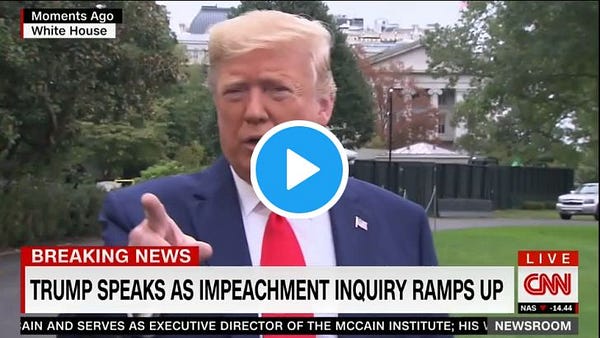Hello! And welcome to the 50th(!!!) episode of Inside The Newsroom. Crazy past few days with shitshows happening on both sides of the Atlantic, and today’s guest Hadas Gold broke everything down from a U.S.-Europe standpoint. Hadas has covered politics, media and tech for CNN since 2017, and has been named one of the most influential media reporters in the game. And Hadas has a pretty cool journey — born in Tel Aviv, grew up in Arizona and now lives in London — so she’s pretty qualified to give her opinion on everything happening right now. Below are analyses of our conversation. Enjoy 🤓
Trump vs The Media
Trump’s tenure as president has been filled with inflammatory rhetoric toward the media, from calling us “fake news” to “the enemy of the people.” Trump spouts phrases like these openly and willingly without a care in the world for their consequences. But the consequences for journalists are real. Five journalists at the Capital Gazette in Maryland were killed in 2018, and Hadas’ own organization had mail bombs sent to it the same year. One thing Trump does realize is that other autocratic leaders around the world look up to the U.S., and the likes of Brazil’s Jair Bolsonaro, who recently said the “deceitful” media was hyping the wildfires in the his country’s Amazon rainforest, have made this a dangerous time to be a reporter.
Thanks to the Committee to Protect Journalists for creating a database that tracks all attacks on journalists around the world.

Have We Become Desensitised To Trump’s Bullshit?
With Trump saying something dumb seemingly every day, it’s easy to become desensitized to how outrageous one scandal or another really is. We’re only humans and I know it’s effected me in terms of what I take in or just gloss over. I asked Hadas how she deals with this problem and she said it’s a constant battle of deciding what’s most important to her audience, but it’s crucial that the same standards are met with every piece of breaking news. Sigh.
Katie Rogers, the New York Times
Tell a Friend About Me?
If you like what you’re reading right now, consider sending a friend or a loved one this link. If that’s too much, how about giving me a cheeky like instead by clicking the ❤️ up top. I’m very grateful.
Will You Help Me, Boris?
A classic case in point of being densensitized is the Times (of London) report from Wednesday that Boris Johnson is the latest foreign leader that Trump has solicited to help him at home. If true, that would take his tally to three that we know of — the Ukraine and Australia being the other two. But Trump laid another nuclear bomb on Thursday when he said, in front a group of reporters with actual cameras, that the Ukraine should indeed investigate the Bidens.


Trump is literally in the midst of an impeachment inquiry over whether he asked a foreign government (he did) to investigate a political opponent, and admitted to doing so (again) in front of reporters with actual cameras. Oh, and he added China to his list for good measure.
Is Boris Johnson Really the UK’s Donald Trump?
Related to their phone call, Boris and Donald have been likened to one another, and not just because of their terrible hair up top. Both have led a dangerous agenda of inciting fear and hate, have both led successful campaigns to divide a nation and now find themselves leaders of two of the world’s most powerful countries. BUT, and it’s a big but, the duo do have their political differences. Perhaps most distinctly is Trump’s economic protectionism to isolate the U.S. from the rest of the world, whereas Johnson is more laissez-faire, and government economic intervention is a bad thing.
Trump to Reset Relationship With EU
If there was one word to describe Trump’s relationship with the European Union, it would be ‘strained’. Since he entered office, Trump has disagreed with the EU on several issues including on Iran, trade and climate change, and is a vocal supporter of Brexit (Brex-shit, am I right?). Mike Pompeo, Trump’s chief diplomat, met with the EU’s incoming leadership team last month in an attempt to reset their relationship. But Pompeo’s credibility went down the toilet this week after it was revealed that he was on the phone call with the president of Ukraine, the same phone call that Volodymyr Zelensky trashed several European leaders. Not a good look, Mike.
David M. Herszenhorn, Politico
⭐️ Thanks so much for reading. If you haven’t already, please consider subscribing to get a newsletter about a cool news topic once a week. You can find me on Twitter or on email if you want to suggest a guest you want me to interview. ⭐️
The Strange Case of Naga Munchetty
BBC breakfast show host Naga Munchetty was reprimanded by her bosses last week for expressing a personal response to the president’s racist July statement that four American congresswomen of color should “go home”. Munchetty, a black journalist, was incredibly open and insightful into the insults she’s received in the past, and some viewers had a problem with that. Turns out one particular viewer’s complaint made it all the way to the top, and the BBC sided with said viewer. After a major backlash inside and outside of the organization, BBC chief Tony Hall finally reversed the decision.
Irish Backstop
Shameful plug time as my colleagues and I at the Guardian showed what will happen to the Ireland-Northern Ireland border in the event of a no-deal Brexit. Johnson is currently trying to find a solution to the backstop, but is finding it increasingly difficult, because, well, Brexit was a bad idea to start with.

Sean Clarke, Me, Pablo Gutiérrez, The Guardian
Related Podcasts
#35 — Richard Deitsch (The Athletic)
#21 — Anna Soubry (MP for Broxtowe)
Last Time














Share this post